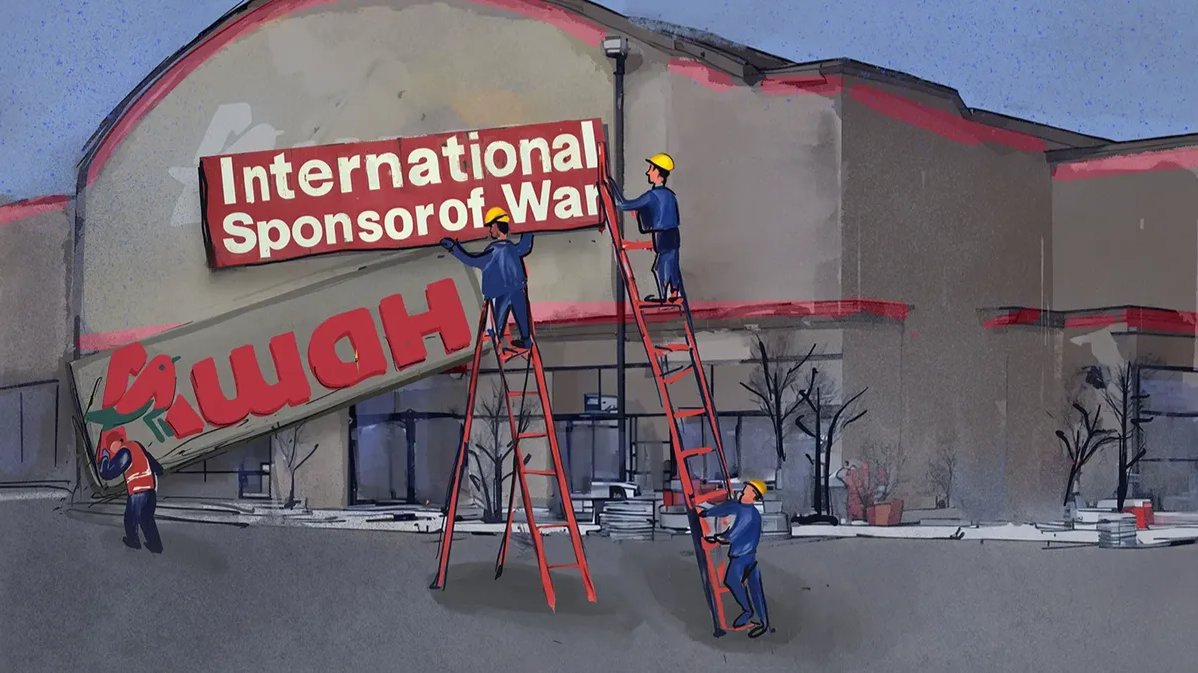The Russian authorities are fond of saying that foreign firms only pretend to have left Russia, and even if they do, they always come back. Novaya Gazeta Europe’s latest data investigation found that the Kremlin, for once, had a point.
Of 110 major foreign companies still working in Russia, 51 never even planned to leave, while another 40 have changed their minds or been unable to sell their assets at an acceptable price. We discuss the five main strategies allowing them to remain in the country in wartime.
Shortly after Russia launched its full-scale invasion of Ukraine on 24 February 2022, the four international tobacco giants on the Russian market — Japan Tobacco, Philip Morris, British American Tobacco and Imperial Brаnds — made statements in which they committed to leaving the country and selling their business interests there. Even in 2022, analysts were extremely sceptical of these plans, and two years on, with only British American Tobacco and Imperial Brаnds having left, and many other major companies continuing to operate in Russia despite being labelled “international sponsors of war” by Ukraine, it appears that scepticism was well founded.
The five strategies used by firms that stayed
Novaya Gazeta Europe studied 110 foreign companies which either worked in Russia in 2023, or had left by the second half of the year. We took the 50 largest foreign companies on the Forbes list for 2023 and added companies from a list compiled last year by Novaya Gazeta Europe, ranking the top 100 most profitable foreign companies in Russia in 2022 (excluding those who had left the country by July 2023).
We found that all of these companies could be divided into five categories depending on their work strategy in Russia.
The largest group of 51 companies has opted to “wait silently”. The most that these companies did upon the outbreak of war was express concern, though most said nothing at all. Some even pledged publicly that they would continue working in Russia. Companies using this strategy include Auсhan, Metro, Calzedonia, Ecco, Benetton, Ehrmann, TotalEnergies, Rockwool, Mitsui, and several leading pharmaceutical companies.
While financial reports for 2023 have not yet been published, these companies netted a profit of 448 billion rubles (€6.04 billion at the time) in 2022, according to Novaya Europe’s calculations.
The second largest group, which numbered 40 companies, opted for the “promising to leave but not leaving” option: they all pledged to sell their Russian businesses, to withdraw from the Russian market, and to ditch their development plans, but they maintained various assets in the country: such as factories, retail chains, brands, services or deliveries.
Companies in this group include BP, JTI, PMI, Pepsico, Mars, Nestlé, Raiffeisen, UniCredit, Intesa, ABB, Bacardi, and Campari. This group is smaller in number, but larger in terms of total profit — 669.6 billion rubles (€9.03 billion). We put three companies (Leroy Merlin, Decathlon, Adidas) in a separate group, which maintained their brands in Russia in various ways — essentially, they “left without leaving”. None revealed its profits for 2022.
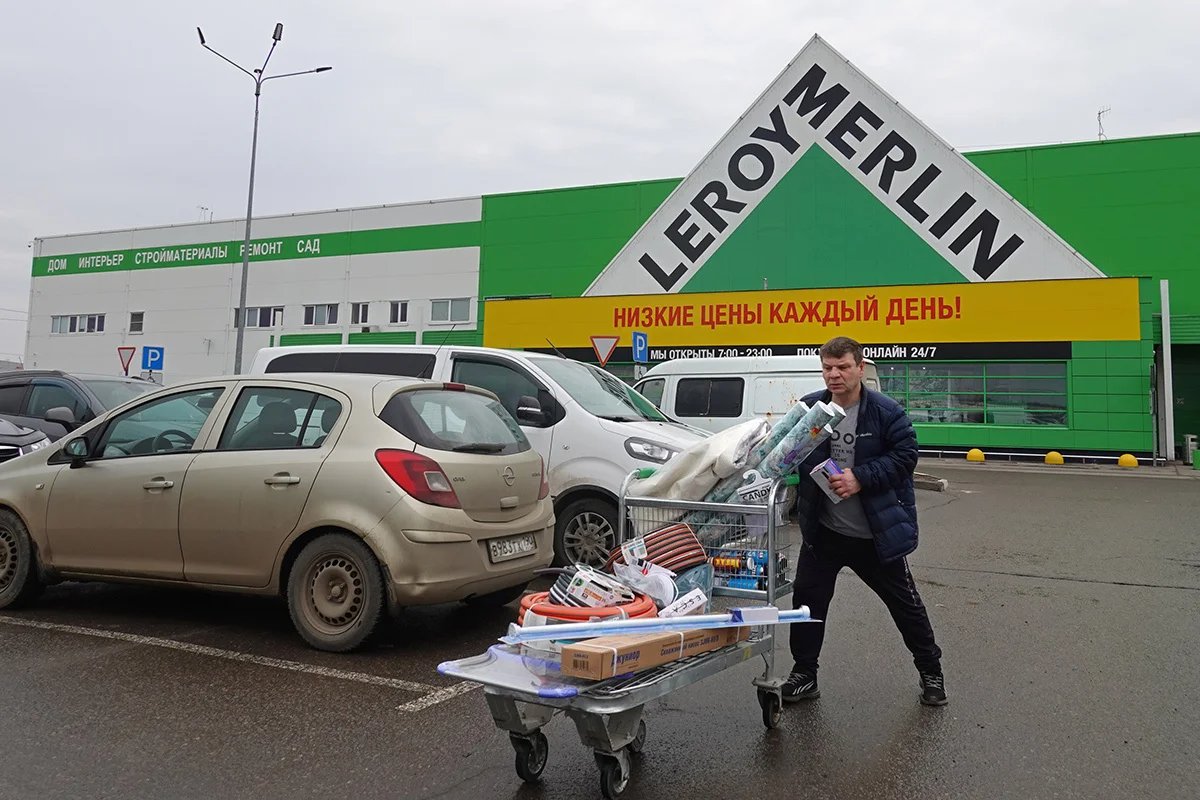
A Leroy Merlin store in the Moscow region, March 2023. Photo: Maxim Shipenkov / EPA-EFE
Two small groups in which we included eight companies each followed the strategies “sitting it out to the end” and “losing everything”. The first group (total profit of 43 billion rubles (€580 million)) promised to leave the market, but did not sell their business until the second half of 2023, usually at a discount and a loss. They are Hyundai, Kia, Volvo, Ingka Group (its segment of Mega shopping centres), AB InBev, Veon.
The same number of companies waited for confiscation measures or external intervention, as they had either fallen out with the Russian authorities, or were now, as the Kremlin admits, a “compensation fund”, designed to deter the West from recovering Russian assets (Danone, Carlsberg, Fortum and others with a total net profit of 48.8 billion rubles (€658.4 million).
Twenty US companies in total favour the first two strategies for maintaining business in Russia — the largest number from a single country. Fourteen German companies (12 of which are “waiting silently”), and 11 Italian companies have also opted for this approach.
Among those following the "waiting silently" strategy or "promising to leave but not leaving", companies from the USA, Germany and Italy predominate
*based on the Forbes 2023 list and Novaya Gazeta Europe list of the top 100 most profitable foreign companies in 2022
Source: calculations by Novaya Gazeta Europe based on company reports and media publications
Hostages and ‘tricksters’
Many companies that promised to leave Russia but didn’t, as well as those who kept silent for two years, have found themselves essentially held hostage by the Kremlin, according to sources we spoke to for this article. Russia’s Central Bank is building a mechanism for exchanging blocked assets, so if there are sufficient foreign companies who want to leave but can’t, the Central Bank can propose swapping its own blocked assets abroad in exchange for business assets in Russia, one expert from a major analytics company says.
Foreign companies have also been made “hostages” by the huge number of restrictions placed on them in Russia, meaning that withdrawal from the country cannot be carried out without serious losses, the source said. Most notably, declaring bankruptcy has been prohibited, and if there are signs of deliberate bankruptcy, managers face criminal charges.
Global corporations including Mitsubishi Motors, ABB, and General Electric attempted to sell their factories in Russia, but were unable to do so profitably, and were unprepared to lose everything. They have all stopped production in Russia.
But there is also a group of companies which has done the exact opposite — the “tricksters” — which understand all too well that they are protected by their market position in Russia, as a Kremlin expropriation of their assets would have negative consequences for the Russian economy.
Tobacco companies are a good example of this phenomenon, according to industry sources. Just two of the “Big Four” cigarette makers working in Russia before the war, British American Tobacco and Imperial Brаnds have sold their Russian assets, while Japan Tobacco and Philip Morris are in no hurry to leave.
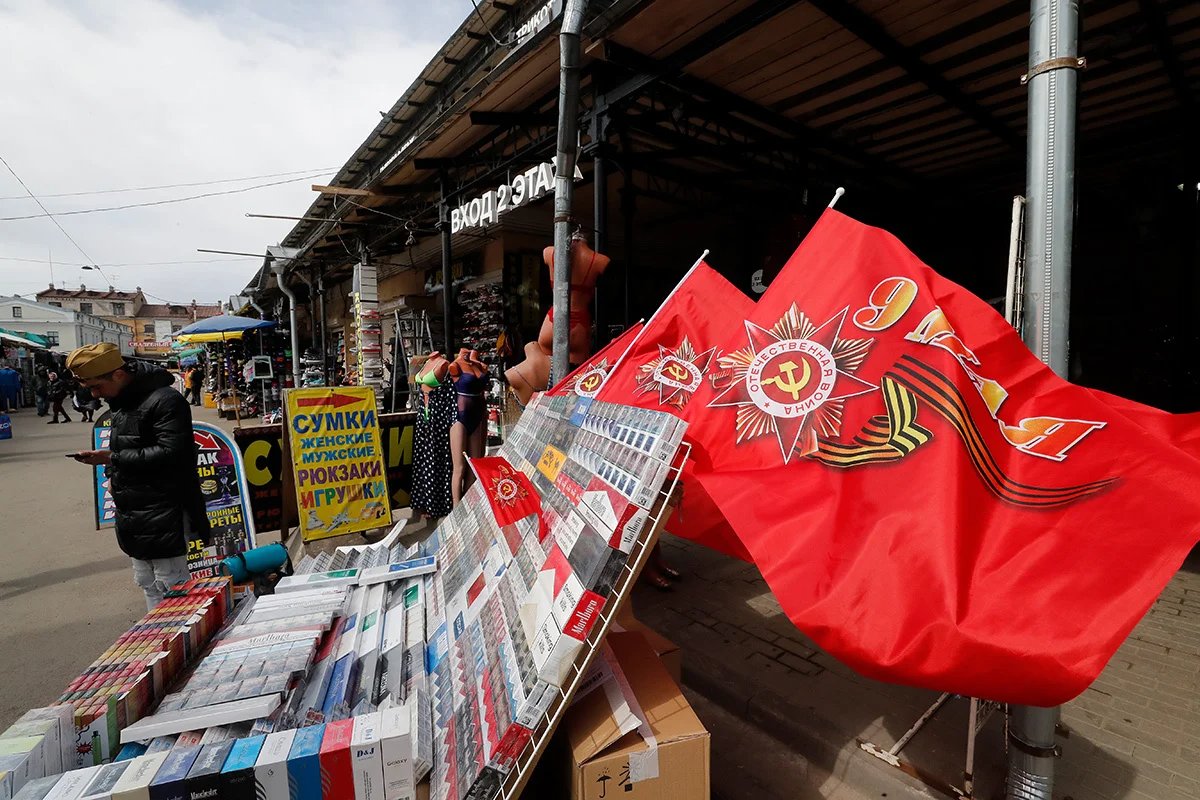
Cigarettes sold alongside Victory Day banners at a market in St. Petersburg, May 2022. Photo: Anatoly Maltsev / EPA-EFE
If Russia were to nationalise the Russian factories of tobacco corporations, those same factories could face serious problems with deliveries of raw materials, experts note. “Tobacco plantations, of course, are not owned by cigarette manufacturers. But global corporations still know how to work with plantation owners, who may make concessions to world giants and cause problems with tobacco deliveries to Russia,” a tobacco industry expert told Novaya Gazeta Europe.
For global tobacco companies, the Russian market is at least the second largest in the world, and they cannot afford to lose it, another source in the industry said, adding that they want “to sit it out here to the end and collect the profits”. For example, the Russian market accounted for €594 million, or over one fifth, of the €2.85 billion net profit made by Japan Tobacco globally in 2022.
Promising to leave doesn’t mean leaving
Companies that announced plans to leave Russia but stayed, only partially reducing their presence, include several global food and drink manufacturers. Among them are four of the world’s largest drink suppliers.
All of these companies, as well as giants such as Mars, Nestlé, and Procter & Gamble, behaved in roughly the same way. While in the first days of the war they released statements announcing the partial suspension of their Russian operations, as the war entered its third year, their businesses in Russia remained operational.
Both Coca-Cola and PepsiCo retained their factories in Russia and simply went on to produce local brands, having removed global brands from the market.
The most interesting case is Bacardi: immediately after the outbreak of the war, the largest family-owned alcohol company in the world announced that deliveries to Russia had been suspended, and investments had been frozen. But in August 2023, The Wall Street Journal drew attention to the fact that these promises had vanished from the company website. Bacardi not only maintained deliveries, but continued to sell William Lawson’s whisky in Russia.
“They are not a public company, and can get away with saying that if there is no direct ban, then it doesn’t concern them. They are helped by the fact that the Bacardi headquarters is located in Bermuda, and they can always say: ‘We’re not an American company, and we decide who to work with ourselves.’ Although in other situations they may associate themselves with the US, where they have a major division,” said a source in the alcohol industry. None of these four drinks giants — Bacardi, Campari, Coca-Cola and PepsiCo — responded to our questions for this article.
Austria’s Raiffeisen Bank used the same strategy. Like dozens of other companies, at the beginning of the war it published a cautiously worded statement — since deleted — announcing that it would be leaving Russia “under strict supervision”. The bank subsequently informed the public of the various withdrawal methods it was considering, including potentially splitting up or selling the business, while constantly postponing the date it would happen.
However, as Reuters reported in late 2023, Austria doesn’t want to break off ties with Moscow completely, which it doesn’t consider to be in its best interests. Moreover, Vienna hopes to remain a destination for the money flowing out of Russia into Europe, Reuters said.
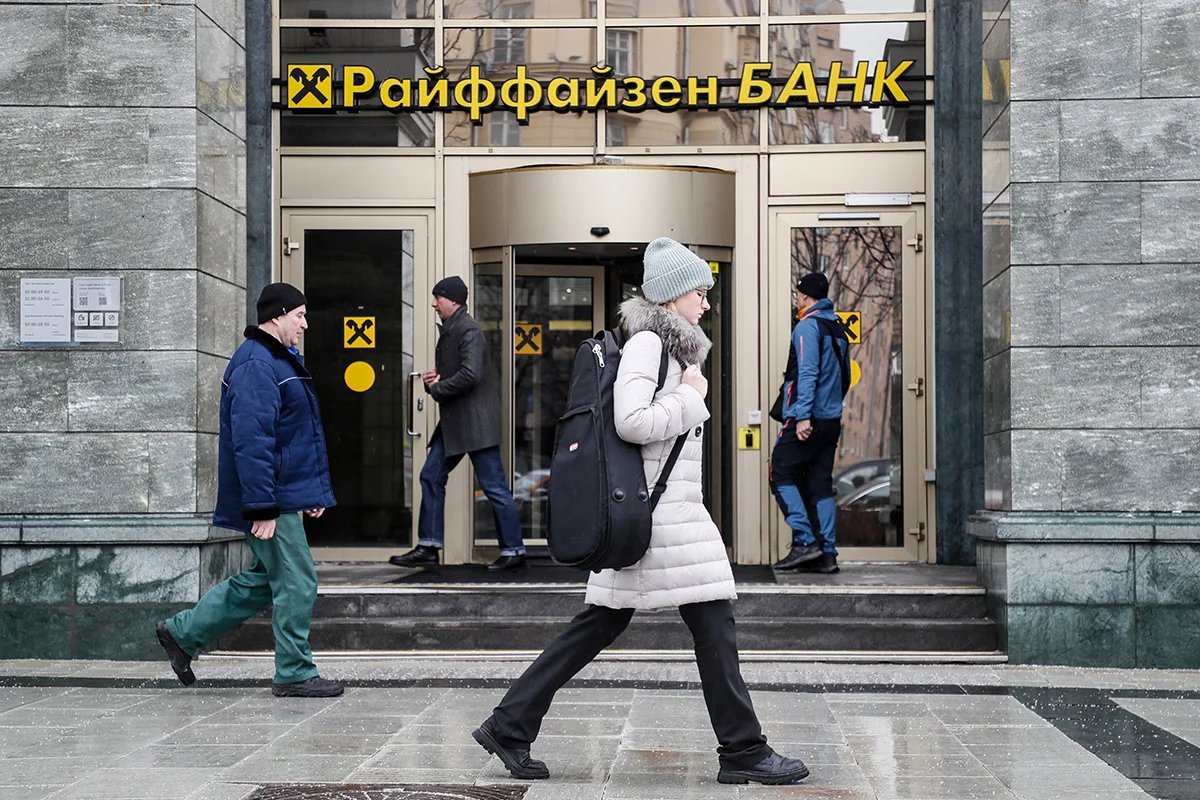
A Raiffeisen Bank office in Moscow, March 2023. Photo: Yuri Kochetkov / EPA-EFE
Keep calm and carry on
“There’s a cynical opinion in this industry that money is everything. The Russian market may only account for a small percentage of their income, but in absolute terms it’s still a lot of money,” said the manager of one major production company in Russia, explaining the strategy of the “silent” companies. “And if you just work away quietly, you’ll be left in peace,” he says.
Among companies that chose the “working and keeping quiet” strategy, the most noticeable are major retail chains such as Germany’s Metro and France’s Auchan and Leroy Merlin.
Auchan, Leroy Merlin and several other European companies are in no hurry to leave, as leaving the Russian market would be far more painful for them than a possible boycott or negative public opinion in the West, says a source in the industry.
In December 2023, data from the Unified State Register of Legal Entities showed that Leroy Merlin had changed ownership: it was now owned by Scenari Holding LP from the United Arab Emirates. But the market was sceptical. One industry source who asked to remain anonymous believes that the French owners have maintained de facto control over the chain. He says that Leroy Merlin, which has 112 hypermarkets in Russia, and is at the top of the Russian Forbes list for foreign companies in terms of turnover, is too large an asset to be sold to a completely unknown company.
Some companies, including Decathlon and Adidas, have opted for the “changing the banner” method. Decathlon sold its Russian business to local company APM (which previously specialised in the restaurant business), which opened stores under the name Desport. They sell the same brands as the old Decathlon did, as the Desport online catalogue can confirm.
Adidas went about its departure in a very cunning way: it subleased some of its stores to Lamoda, remaining a legal entity in Russia, and now sells its goods through an official Russian distributor.
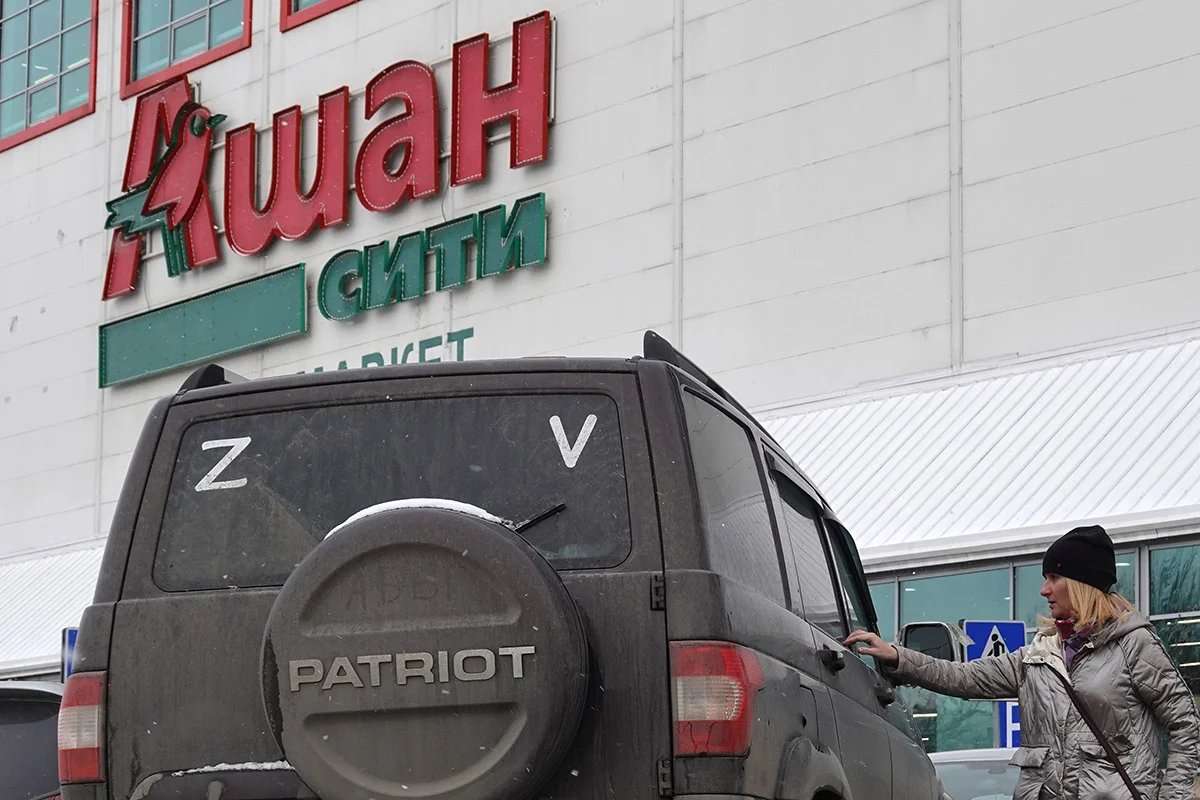
A car marked with pro-war V and Z signs parked in front of an Auchan supermarket. Photo: Maxim Shipenkov / EPA-EFE
The energy departure
The Kremlin made it clear to foreign companies that those that made a fuss over the war in Ukraine would lose everything. This is what happened to oil company Shell and the Carlsberg brewery. Only companies that could reach an agreement with the government could keep their assets, or leave Russia and take their money with them.
For 15 years, Shell produced and liquified gas on Sakhalin, an island in Russia’s Far East, and sold liquified natural gas (LNG) on Asian markets, primarily to neighbouring Japan. When the war broke out, Shell, which had been friendly with the Kremlin for decades, was one of the first to announce that it was withdrawing from Russia. It did so without equivocation, releasing a rather drastic statement four days into the war on 28 February 2022.
This is perhaps why Russian President Vladimir Putin issued a decree on 30 June 2022, effectively seizing 27.5% of the LNG plant on Sakhalin from Shell. Technically, the Kremlin decree took the plant away from all its shareholders, including Gazprom (50%) and the Japanese companies Mitsui (12.5%) and Mitsubishi (10%) (exemplary exponents of the “sit it out” strategy), and transferred ownership to the specially created Russian company Sakhalin Energy. But the Japanese companies and Gazprom, naturally, agreed to become its shareholders. Shell, however, refused the honour.
In the spring of 2023, the Russian government permitted Novatek to buy this block of shares. Novatek is the second-largest gas producer in Russia, and the Kremlin has great hopes that it will conquer the world LNG market. Its export is critically important for the state coffers as the country has come under an oil embargo since the war began.
In spring 2023, Kommersant reported that Novatek co-owner Leonid Mikhelson had asked Putin to permit Shell to take $1.16 billion (€1.07 billion) out of Russia for the sale of a block of shares in the Sakhalin plant and that Putin gave his permission. The deal is still in limbo and has probably not yet been finalised, two oil and gas market sources informed Novaya Gazeta Europe.
When contacted for this article, Shell said that it had nothing to add to what was already written in the FAQ section of the company’s website, which says: “We retain all our lawful rights to our share of 27.5% (minus one share) in Sakhalin Energy Investment Company.” In other words, the company which had its plant seized by Putin.
One of our oil and gas market sources believes this statement could mean that Shell considers the nationalisation unlawful and may sue the Kremlin to protect its rights to the asset.
Unlike Shell, its competitors BP and TotalEnergies, did not make strong statements and did not promise to protect their shareholders’ rights, and managed to preserve their Russian assets as a result. TotalEnergies strategy of continuing to profit from the production of LNG together with Novatek, in which it owns a 19.4% stake. Additionally, the French concern owns packages in joint Arctic gas projects with Novatek.
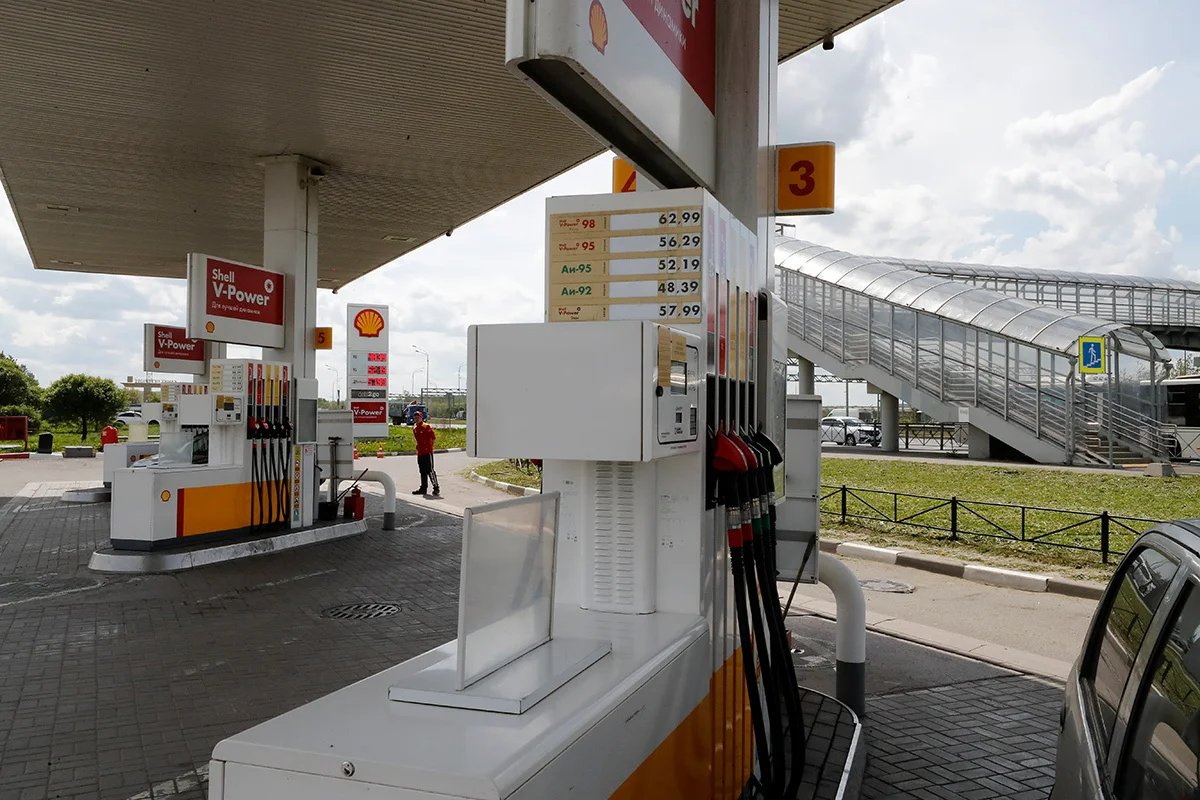
A Shell petrol station in St. Petersburg, June 2022. Photo: Anatoly Maltsev / EPA-EFE
Next in line to leave
Legal experts Novaya Gazeta Europe spoke to disagreed on what’s likely to come next, with some believing that due to public pressure, companies will continue to exit the Russian market whenever possible. Others believe that those wishing to have already left, with those remaining expected to adapt to new business conditions in Russia and will soon learn how to make a profit.
“They will try to get rid of their assets, as pressure on them is strong,” says one legal expert working in Russia who wished to remain anonymous. They won’t do so for financial reasons, because “there is little economic point in selling assets, they can’t take the money out of Russia anyway”, but “this is rather about social responsibility, reputation and so on”. There are also, he believes, “companies that hope to return, as the market is large and attractive. Bridges still exist, but they are not the old bridges, of course. Things won’t go back to the way they used to be.”
But not all companies will be able to return.
“Some have already caused so much trouble that they won’t return,”
said the legal expert, citing the example of Siemens, which in 2022 completely withdrew from its energy, machine-building and financial business in Russia, selling its assets and stopping deliveries and services.
Yegor Noskov, managing partner at the law firm Duvernoix Legal, believes otherwise. He says that the companies that left in the spring of 2022 decided that the damage to their image from continuing to work in Russia exceeded potential profits.
“Other companies calculated that the profit from the Russian market was too important for their business and outweighed the damage to their image, and so they remain on the market, making record profits,” says Noskov, giving Raiffeisen as an example.
It is unlikely that the overall situation with foreign companies in Russia will change, Noskov believes. “I think that the ones that have left will not return until the end of the Special Military Operation, and perhaps not until sometime afterwards.” The ones that have remained will not sell their business, but will adapt to the situation, either using other brands or various schemes that enable them to maintain their presence in the market while avoiding the direct association of Russian assets with their parent companies abroad, says Noskov.
Join us in rebuilding Novaya Gazeta Europe
The Russian government has banned independent media. We were forced to leave our country in order to keep doing our job, telling our readers about what is going on Russia, Ukraine and Europe.
We will continue fighting against warfare and dictatorship. We believe that freedom of speech is the most efficient antidote against tyranny. Support us financially to help us fight for peace and freedom.
By clicking the Support button, you agree to the processing of your personal data.
To cancel a regular donation, please write to [email protected]
